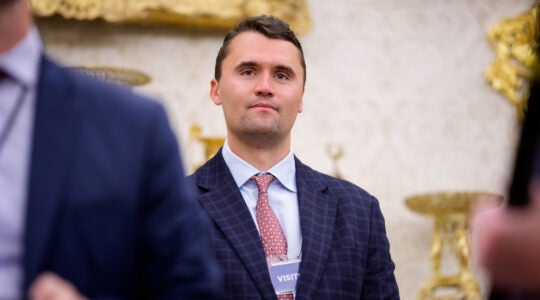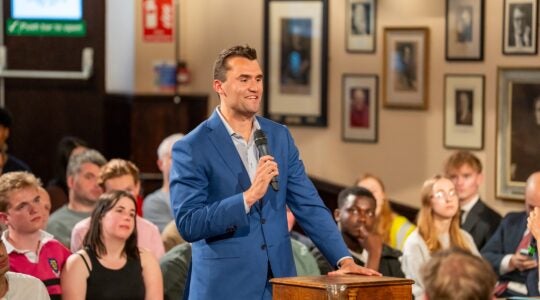NEW YORK (JTA) — In a series of high-level closed-door meetings in Florida, leaders of the Jewish federation system adopted several recommendations for streamlining operations and refining its overall mission — and also appeared to defuse a potentially divisive debate regarding overseas funding.
About 200 lay and professional leaders from Jewish federations across the country met last week in Palm Beach to discuss how to change the workings of the system’s North American organization, the United Jewish Communities.
At the meetings, dubbed the Federation Leadership Institute, participants adopted a proposal calling for new mission and vision statements clearly outlining the UJC’s roles and urging the organization to pursue major initiatives, or "big ideas," for the federation system. Participants also approved a revised set of governance guidelines, along with a plan to continue exploring more effective ways to run the UJC.
"In the current economic crisis, and in the ever-evolving Jewish philanthropy world, UJC needed to address several challenges, and we have accomplished that at the Federation Leadership Institute," Joe Kanfer, chair of the UJC’s board of trustees, said in a statement after the meetings. "The key strategic decisions we’ve made strongly position UJC and its member federations for the future."
Participants at the meeting also opened the door to possibly re-jiggering the way that the federation system spends its money overseas.
Nearly every federation in the system now gives a predetermined figure to the UJC to divvy up between the system’s two overseas partners, the Jewish Agency for Israel and the American Jewish Joint Distribution Committee. The two organizations use the UJC money to cover their core operating budgets.
In addition, many federations also make supplemental contributions to the Jewish Agency and the JDC, as well as other overseas nongovernmental organizations, for specific projects.
Participants at the Florida meetings suggested that the federations and the UJC create a global planning table to explore how to better coordinate the supplemental giving for the entire federation system. Under the proposal, the existing joint pool of federation money would still be used exclusively for covering the core operating costs of the Jewish Agency and the JDC, but the joint supplementary stream could be used to support projects run by other organizations.
In recent years, several major federations — including those in Boston, Philadelphia, Los Angeles and San Francisco — have altered the way they give money to the Jewish Agency and the JDC, allocating more for supplemental projects and less for core operating expense. A few federations have ended core support.
The original drafts of the various proposals were released to participants before the Feb. 8-10 meetings, with the proposal for an overseas planning table setting off a maelstrom of debate.
Richard Pearlstone, the chairman of the board of governors of the Jewish Agency, sent a letter to Kanfer; the chairwoman of the UJC’s overseas committee, Kathy Manning; and the UJC’s top professional, Howard Rieger, claiming that the UJC wanted to siphon money from the Jewish Agency and the JDC in their time of need as the deteriorating global economy is forcing both agencies to cut their budgets.
Kanfer, Rieger and Manning responded with their own letter to Pearlstone, saying that he was wrong to assume that the UJC was looking to abandon the Jewish Agency and JDC. At the same time, the UJC leaders said that the federation system would have to evolve over time.
Overseas funding has long been a point of contention in the federation system. Some large federations insist that every dollar allocated for core budgets should still go exclusively to the Jewish Agency and the JDC, but other federations believe that those two agencies would benefit from an open process that would force them to streamline in order to compete for money with other NGOs.
The vigorous debate before the meetings — which included the president and CEO of the JUF-Jewish Federation of Chicago, Steven Nasatir, vowing to leave the UJC should a plan be adopted that allowed for giving core dollars to organizations other than the two historic overseas partners — was based on concern that UJC leaders were suggesting that the federation system move to an open system.
But after the meetings, UJC and federation leaders said the debate was based largely on a misunderstanding by Pearlstone and miscommunication by the UJC.
“Some people somehow saw the straw models, seeing the food before it was put on the plate, and jumped to conclusions that were off by 99 to 100 percent,” Kanfer told JTA.
Participants reached a consensus at the meetings, which were open only to federation officials and not representatives of the overseas partners.
According to those close to the process, the proposed planning table would operate differently than the failed process, known by the acronym ONAD, that was used for a few years to decide overseas allocations by asking the Jewish Agency and the JDC to make their cases for money every year. The planning table would consist only of federation leaders, who would decide together what are the needs and priorities of the system and then ask the overseas agencies to carry out those needs — in some cases reaching out to additional organizations.
“The fundamental relationship between the Jewish Agency and the Joint on core allocation is what it is today and should be for the foreseeable future,” Steve Hoffman, the president and CEO of the Jewish Community Federation of Cleveland, told JTA after the meetings.
But, he added, it would benefit the federation system to open up the supplemental funding table to non-traditional partners.
“In seeking to have the best understanding of the Israeli scene, there is value in working with other partners other than the Jewish Agency and the Joint, including other NGOs and philanthropists,” said Hoffman, who served a stint as UJC’s top professional.
Even opening up the supplementary funding should be a step taken in consultation with the Jewish Agency and the JDC, Hoffman said.
But, he added, “we should be able to talk to everybody.”
As for the debate before the meetings, Hoffman said it was case of misunderstandings and miscommunication.
“Richie Pearlstone is entitled to interpret things as he reads them, or Richie is entitled to raise concerns, but I don’t think he needed to be concerned,” Hoffman said. “I just wish the UJC had clarified the issue.”
While some proponents of more radical change privately say that the new planning-table proposal could be the first, albeit small, step in an eventual move to end the exclusive relationship that the federations have with the Jewish Agency and the JDC on core dollars, defenders of the current process seemed satisfied after the meetings.
“Under no circumstances would one nickel go to other organizations other than the JDC and JAFI for core funding. Chicago would leave the UJC,” said Nasatir, whose federation gives more money than any other to the Jewish Agency. “This isn’t a threat; this is the way it is. But we are not opposed to supplemental funding for other organizations. What people want to do in a supplemental way, we do think as things change it is OK to explore.”
Several participants praised the meetings in Florida, describing them as productive on several matters, in addition to the developments on overseas funding.
"This is the first time in 10 years that I have felt optimistic that we’re going in the right direction, and that we’ll be able to achieve the goals and aspirations we’ve set out," Shoshanna Cardin, a longtime national lay leader from Baltimore, said in a media release issued by the UJC. "For me, to feel optimistic is big.”
JTA has documented Jewish history in real-time for over a century. Keep our journalism strong by joining us in supporting independent, award-winning reporting.





